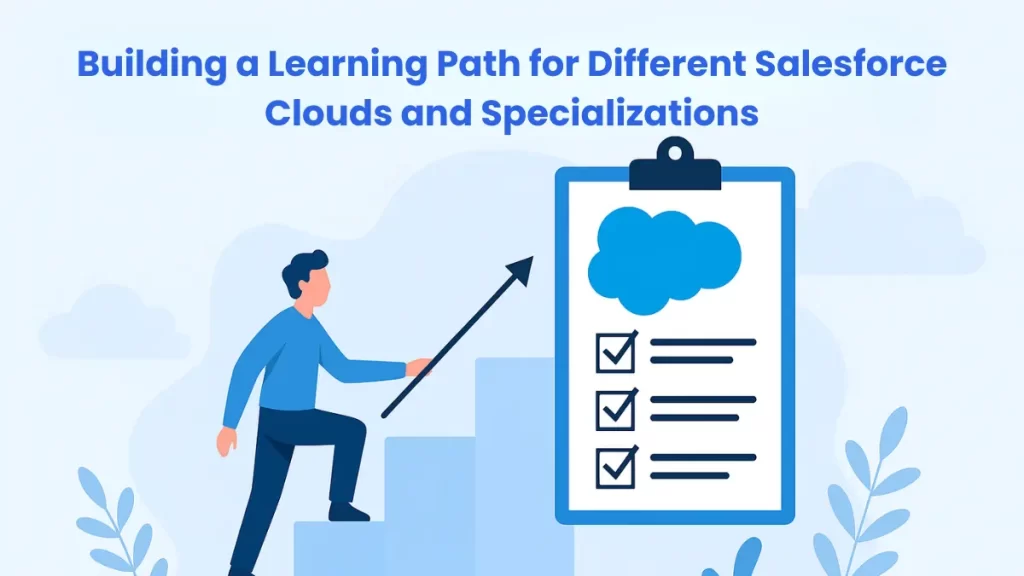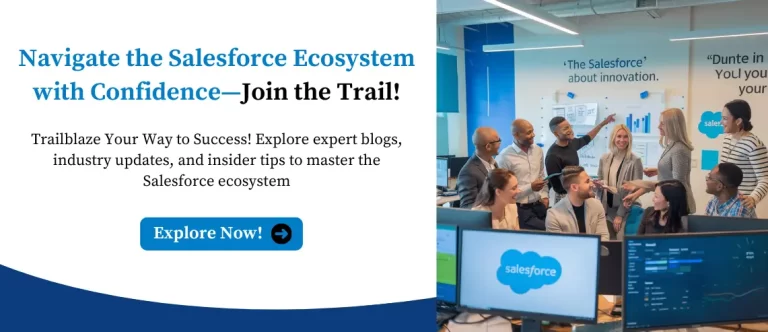The Salesforce ecosystem is a vibrant and ever-expanding universe. With numerous clouds, features, and specializations, it can feel overwhelming to navigate your learning journey. While a general understanding of the platform is crucial, truly excelling and becoming a sought-after Salesforce professional often requires deep expertise in specific areas.
This blog post will guide you through the process of building a personalized learning path focused on different Salesforce Clouds and Specializations, enabling you to achieve your career goals and become a valuable asset to any Salesforce team.
Why Specialize? The Power of Focused Learning
Before we dive into building your path, let’s understand why specialization is so beneficial:
- Increased Demand: More companies are looking for experts who have a deep understanding of particular Salesforce Clouds (e.g., Sales Cloud, Service Cloud, Marketing Cloud) and specializations (e.g., Field Service Lightning, Einstein Analytics).
- Higher Earning Potential: Specialized skills tend to earn higher wages because they are rare and essential for a company’s success.
- Greater Job Satisfaction: Focusing on an area you’re passionate about can lead to more engaging and fulfilling work.
- Deeper Understanding: Specialization allows you to delve into the intricacies of a particular area, becoming a true expert and problem-solver.
- Career Advancement: Demonstrating expertise in a specific domain can open doors to leadership roles and more strategic responsibilities.
Step 1: Identify Your Interests and Career Goals
The first and most crucial step is self-reflection. Ask yourself:
- What aspects of Salesforce excite me the most? Do you enjoy streamlining sales processes, enhancing customer service, crafting marketing campaigns, or analyzing data?
- What type of position do I see for myself within the Salesforce ecosystem? Do you see yourself as an administrator, developer, consultant, analyst, or architect?
- What are the current market demands and growth areas within Salesforce? Research in-demand skills and specializations.
- What are my existing skills and experiences that can be leveraged? Think about your experience in sales, marketing, customer support, technology, or business analysis.
Based on your answers, you can begin to identify Salesforce Clouds and Specializations that align with your interests and career aspirations.
Popular and Different Salesforce Clouds and Specializations to Consider:
Here are a few examples to get you started:
- Sales Cloud: Focuses on sales process automation, lead management, opportunity management, and forecasting. Specializations within Sales Cloud include Sales Operations and Sales Cloud Consultant.
- Service Cloud: Centers around customer support, case management, knowledge base, and omnichannel service. Specializations include Service Cloud Consultant, Field Service Lightning, and Customer Service Analytics.
- Marketing Cloud: Empowers marketers with tools for email marketing, social media marketing, advertising, and customer journeys. Specializations include Email Specialist, Marketing Cloud Consultant, and Marketing Cloud Developer.
- Experience Cloud (formerly Community Cloud): Facilitates the creation of customized digital experiences for customers, partners, and employees. Areas of expertise include Experience Cloud Consulting & Community Management.
- Field Service Lightning: Enhances the management and scheduling of mobile workforces for field service operations. The Roles of Field Service Lightning Consultant and Administrator are essential.
- Einstein Analytics (Tableau CRM): Provides powerful data visualization and analytics capabilities within Salesforce. Einstein Analytics developers and consultants are sought after.
- Salesforce Industries (Vlocity): Customized solutions designed for various sectors such as Communications, Financial Services, Health, and the Public Sector. Each specialization is focused on a specific industry.
- Development (Apex, Lightning Web Components): Specializing in Salesforce development offers numerous opportunities for individuals with coding skills.
Step 2: Define Your Learning Objectives and Resources
Once you’ve identified your target Cloud or Specialization, it’s time to define specific learning objectives. What skills and knowledge do you need to acquire?
Next, explore the vast array of learning resources available:
- Trailhead: Salesforce’s free learning platform is an invaluable resource for foundational and advanced knowledge across all Clouds and specializations. Follow relevant trails and modules.
- Official Salesforce Documentation: The official documentation provides in-depth information on features, functionalities, and best practices.
- Salesforce Certifications: Pursuing relevant certifications validates your skills and knowledge and is highly valued by employers. Research the certifications aligned with your chosen path.
- Webinars and Events: Salesforce and the wider community offer numerous webinars and events focused on specific topics.
- Online Courses (Udemy, Coursera, Pluralsight): These platforms offer structured courses often taught by experienced professionals.
- Community Forums (Trailblazer Community): Engage with the Salesforce community to ask questions, share knowledge, and learn from others.
- Hands-on Experience: The most crucial aspect of learning is practical application. Get hands-on experience through Trailhead Playgrounds, developer orgs, or real-world projects.
- Mentorship: Connecting with experienced Salesforce professionals can provide valuable guidance and support.
Step 3: Create a Structured Learning Plan
Now, it’s time to create a structured learning plan. This will act as your roadmap and help you stay organized and motivated. Consider the following:
- Start with the Fundamentals: Make sure you fully grasp the fundamentals of the Salesforce platform before exploring the individual Clouds.
- Break Down Your Learning: Divide your learning objectives into smaller, manageable tasks.
- Set Realistic Timelines: Allocate specific timeframes for each learning module or certification preparation.
- Prioritize Key Skills: Concentrate on the key skills and ideas relevant to your selected specialization.
- Include Hands-on Practice: Dedicate significant time to applying what you learn in practical scenarios.
- Regularly Review and Adjust: Your learning plan should be flexible. Review your progress regularly and adjust it as needed.
Example Learning Path for an Aspiring Sales Cloud Consultant
- Salesforce Administrator Certification: Build a strong foundation in core Salesforce administration concepts.
- Sales Cloud Basics Trailmix on Trailhead: Understand the fundamental features and functionalities of Sales Cloud.
- Hands-on with Sales Cloud: Practice configuring sales processes, managing leads, and opportunities in a Trailhead Playground.
- Sales Cloud Consultant Certification Preparation: Study the official study guide and practice exams.
- Explore Advanced Sales Cloud Features: Dive into topics like Sales Cloud Einstein, Territory Management, and Advanced Reporting.
- Consider a Specialization: Explore areas like Sales Operations or Revenue Operations within Sales Cloud.
- Network with Sales Cloud Professionals: Engage in the Trailblazer Community and attend relevant events.
Step 4: Stay Current and Continuously Learn
The Salesforce ecosystem is constantly evolving with new releases and features. Continuous learning is essential to stay relevant and valuable.
- Follow Salesforce Release Notes: Stay updated on the latest features and changes.
- Engage with the Trailblazer Community: Participate in discussions and learn from others’ experiences.
- Attend Webinars and Events: Keep abreast of new trends and best practices.
- Explore New Trailhead Modules: Salesforce regularly releases new content.
- Consider Advanced Certifications: As you gain experience, pursue more specialized certifications.
Final Thoughts: Your Journey to Salesforce Expertise
Building a learning path for specific Salesforce Clouds and Specializations is an investment in your future. By identifying your interests, defining your objectives, leveraging available resources, and staying committed to continuous learning, you can carve out a successful and fulfilling career within the dynamic Salesforce ecosystem. Embrace the journey, stay curious, and become the Salesforce expert you aspire to be!
Must-Visit Links:
- How to Crack the Salesforce Interview: Real Questions and Tips from Experts
- How Much You Can Earn as a Salesforce Consultant in 2025?
- Top Most In-Demand Salesforce Skills for 2025: What Professionals Need to Know
- The Importance of Hands-On Experience in Mastering Salesforce Skills
- How I Passed the Salesforce Data Architect Exam on My First Attempt
- How to Prepare for the Certified Agentforce Specialist Certification Exam
Resources
- [Salesforce Developer]- (https://developer.salesforce.com/)
- [Salesforce Success Community] (https://success.salesforce.com/)
For more insights, trends, and news related to Salesforce, stay tuned with Salesforce Trail
Mark Jacobes is a seasoned Salesforce expert, passionate about empowering businesses through innovative CRM solutions. With over 6 years of experience in the Salesforce ecosystem, Mark specializes in Salesforce development, integrations, and digital transformation strategies.
- Mark Jacobeshttps://salesforcetrail.com/author/markjacobes/September 8, 2025
- Mark Jacobeshttps://salesforcetrail.com/author/markjacobes/
- Mark Jacobeshttps://salesforcetrail.com/author/markjacobes/
- Mark Jacobeshttps://salesforcetrail.com/author/markjacobes/













